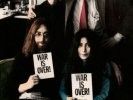Eye For Film >> Movies >> The US vs John Lennon (2006) Film Review
Despite an overwhelming opposition to the war in Iraq and mistrust of all things Dubya, the United States in 2006 is not on the brink of revolution, which makes it hard for those who weren't there to understand what was going on at the height of the anti-Vietnam protests, civil rights marches and Black Panther activism of the late Sixties.
The issue of John Lennon's expulsion from the country on the pretext that earlier in The Beatles' career he had been caught in possession of happy baccy is a reflection of President Nixon's voracious paranoia. The idea that America still retained Jeffersonian principles of justice was dashed long before four students were shot and killed during a Kent State University protest march. Once the FBI, under J Edgar Hoover, was allocated responsibility by the White House to defend the nation against anarchists, longhairs, Communists, black separatists and peaceniks, freedom of speech and the rights of an individual to express opinions, contrary to those of the government, were metaphorically torn to shreds.

David Leaf and John Scheinfeld's film is careful not to turn this into a Mooreish attack on the G.O.P, with contemporary references to rendition and torture. Although Lennon was manipulated (allegedly) by the peace movement, represented by Yippie leaders Abbie Hoffman and Jerry Rubin, his views on American involvement in Vietnam were shared by the majority of students throughout the world, the difference being he did something about it - the Amsterdam and Montreal bed-ins, the anthem Give Peace A Chance, personal appearances at rallies and the fact that he had moved to New York permanently, or so he thought.
He was put through the full secret police surveillance treatment, complete with phone tapping and stakeouts, while state prosecutors concocted court case after court case to have him extradited. His crime? Criticising the actions of the US government, while not being an American.
An impressive array of commentators, peaceniks, politicians and writers - the white hairs - are given soundbite opportunities to express their feelings on Lennon and the times. Without exception, they make valuable contributions. It is intriguing to witness the mellowing of such star activists as Angela Davis and Bobby Seale and be reminded of John Sinclair who was jailed for 10 years for smoking a couple of joints and listen again to Gore Vidal's comment on patriotism - "the last refuge of the scoundrel."
The best part is the John/Yoko love pact. From snatches of old footage and home movies, what comes across is their compatibility and devotion (John: "It was a relief to find someone as far out as me"). While the English tabs and music journos were demonising Yoko for killing off The Beatles and dominating John, all you have to do is look at them together to see what nonsense that is.
John calls himself a natural rebel, drawn to rebellious movements, always the outsider. Yoko, with her art and later in her relationship, is the same. She talks of him now without sentimentality. When asked how he felt about the government's actions, after finally winning his case to stay, John replies, with a smile, "Time wounds all heals."
He is much missed.
Reviewed on: 08 Dec 2006If you like this, try:
Chicago 10Good Night, And Good Luck
The Killing Of John Lennon
Woodstock Diaries





















